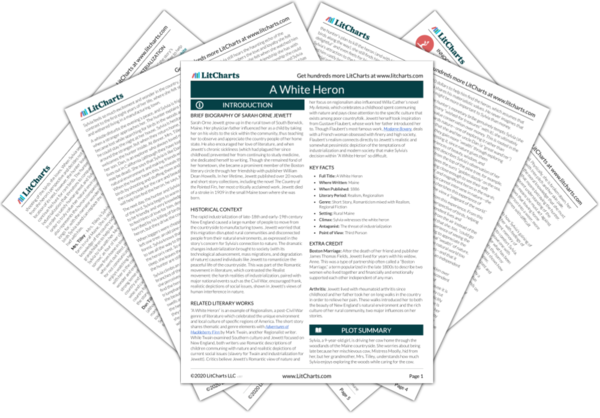The white heron symbolizes the independence and wonder of nature, which must be preserved against the destructive forces of industrialization and greed. When Sylvia sees the heron’s spectacular perspective on the world from the top of the tree, she makes a moral choice to refuse to help the hunter kill the bird. Her rejection of the hunter’s greedy mission in favor of the majesty of nature shows that attempts to possess nature, rather than simply appreciate it, do not honor nature’s importance. Additionally, the heron is white, the color most often associated with purity, thus representing the purity of nature free from human interference. By sparing the white heron, Jewett suggests the value inherent to keeping nature pure and separate from human violence and intervention. Jewett also proposes a particular attitude towards nature through Sylvia’s interaction with the heron: Sylvia recognizes the value of the heron’s life only after seeing the world through the heron’s eyes and therefore coming to identify personally with its perspective. Sylvia’s identification with the heron mirrors the identification Jewett wants people to have with nature, so that they may recognize nature’s independence and wonder and therefore choose to protect it from human ambitions.
White Heron Quotes in A White Heron
“I am making a collection of birds myself…there are two or three very rare ones I have been hunting for these five years. I mean to get them on my own ground if they can be found.”

Unlock explanations and citation info for this and every other A White Heron quote.
Plus so much more...
Get LitCharts A+Has she been nine years growing, and now, when the great world for the first time puts out a hand to her, must she thrust it aside for a bird’s sake?
The murmur of the pine’s green branches is in her ears, she remembers how the white heron came flying through the golden air and how they watched the sea and the morning together, and Sylvia cannot speak; she cannot tell the heron’s secret and give its life away.












